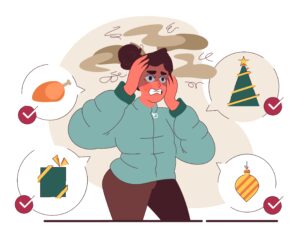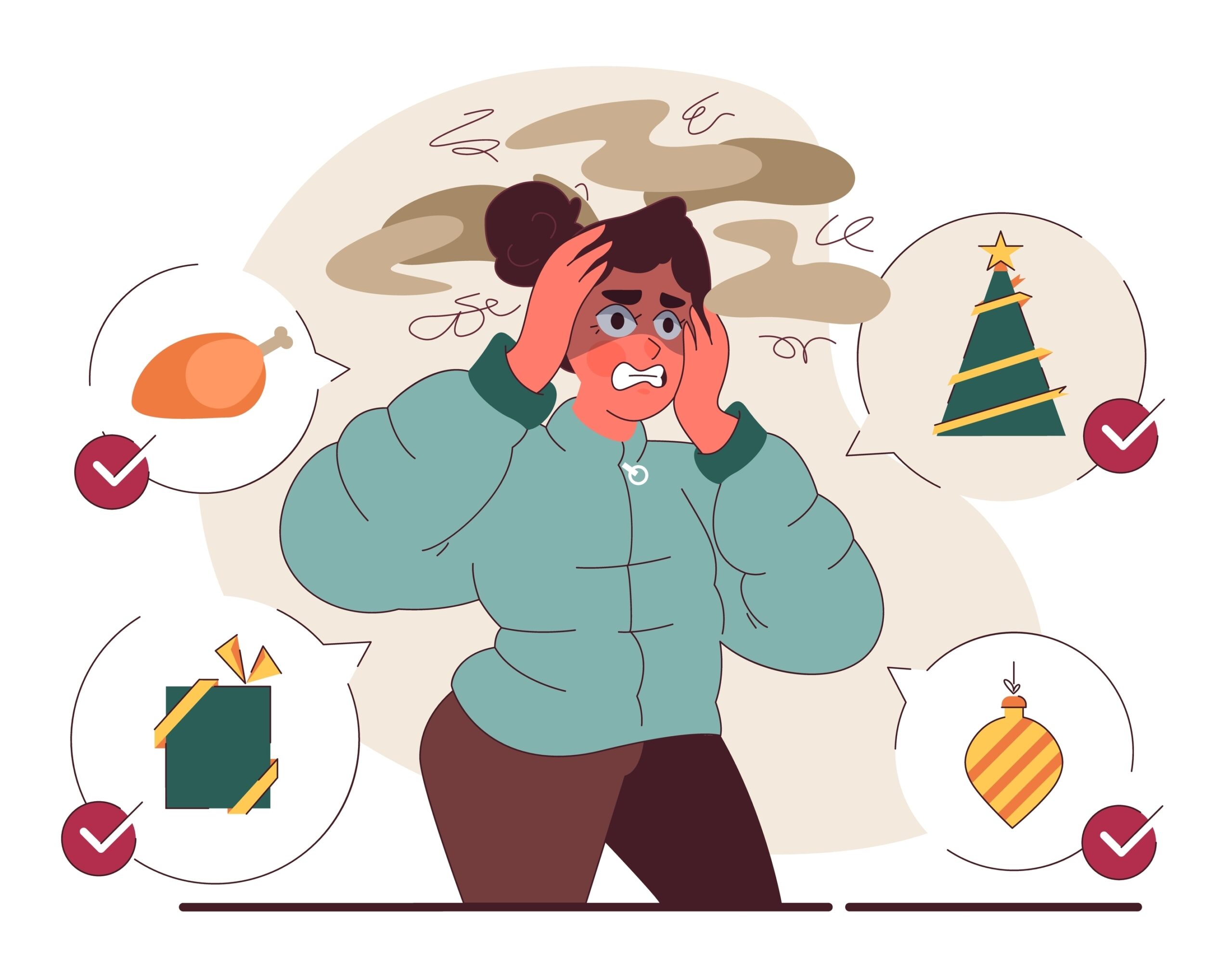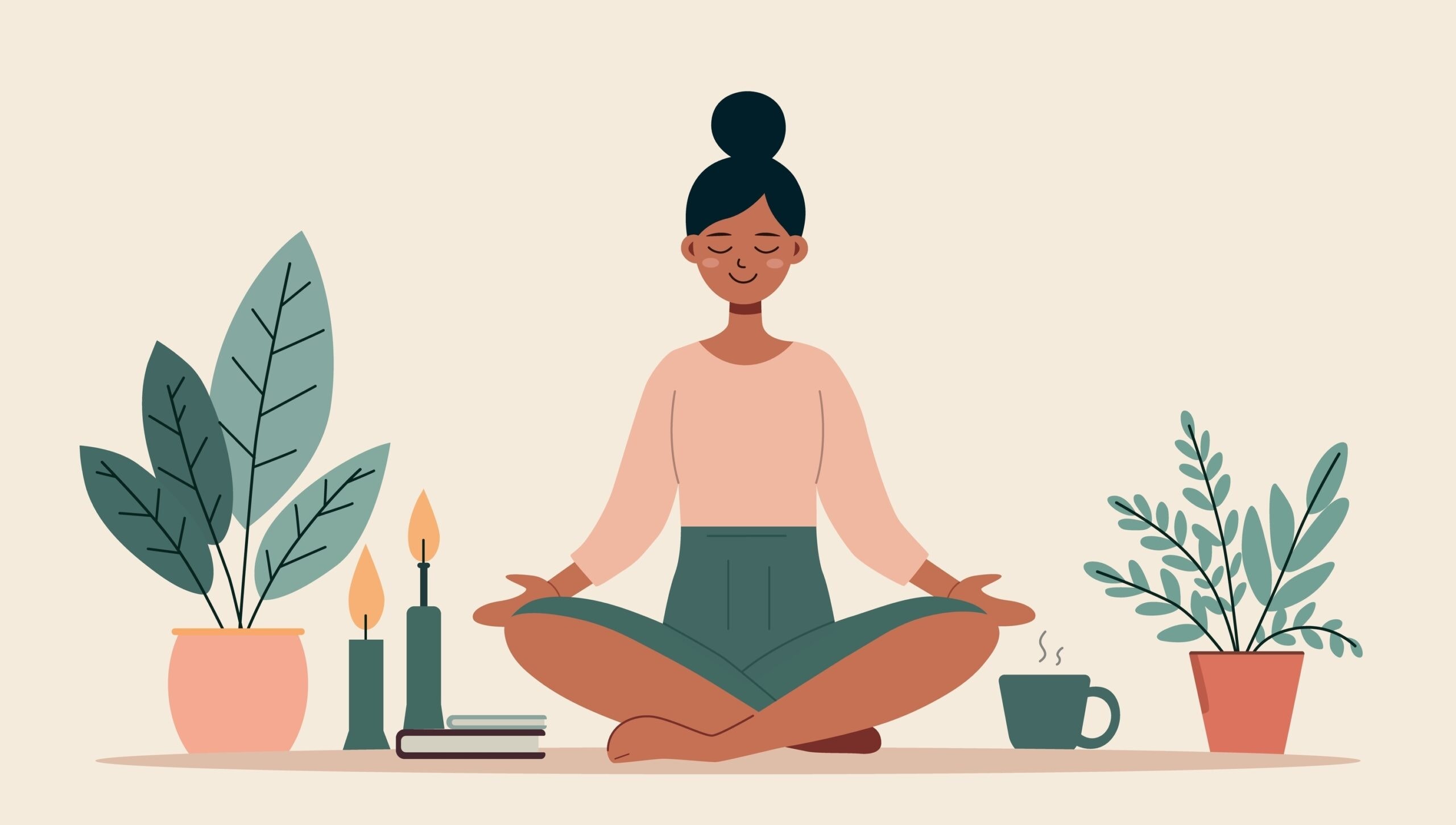This season, your social feed is probably full of gratitude challenges. Day 1: I’m grateful for my family. Next Day: Today, I’m grateful for my health. Last Day: I’m grateful for… coffee?
It all sounds wholesome. But here’s the uncomfortable truth: gratitude burnout is real.
And if you’re forcing yourself to feel thankful while simultaneously drowning in stress, your brain knows you’re faking it.
When Gratitude Becomes Another Thing You “Should” Do
Let’s be honest about what’s really happening this holiday season.
You’re exhausted. You’ve been running on fumes for months. The to-do list keeps growing. Social gathering prep, work deadlines, family dynamics, combined with year-end pressures. Maybe you’re not sleeping well or have abandoned your healthy habits. Maybe you’re just trying to survive.
And then someone tells you: “Just practice gratitude! It’ll help with stress.”
So you start a gratitude journal. You post thankful thoughts online. You tell yourself you should feel blessed.
But instead of feeling better, you feel… worse. More guilty, pressured, and fake.
That’s gratitude burnout.
It happens when gratitude shifts from genuine appreciation to performative obligation. When “I’m thankful” becomes another item on your checklist. When being positive feels like a requirement, not a reflection.
And your brain? It’s paying attention.
The Neuroscience of Fake Gratitude
There’s a tiny brain structure called the habenula you may have heard about before… It’s your internal BS detector.
The habenula’s job is to monitor your efforts and outcomes. When it senses you’re failing or operating from fear, it shuts down motivation. But here’s what most people don’t know: the habenula also detects inauthenticity.
When you force gratitude while feeling stressed, resentful, or burned out, your brain registers the disconnect. You’re essentially lying to yourself—and the habenula knows it.
This creates what researchers call “emotional dissonance.” You’re telling yourself one story (“I’m so grateful!”) while feeling something completely different (exhaustion, resentment, pressure). The result? More stress, not less.
True gratitude activates reward pathways in your brain. It genuinely reduces stress and improves well-being.
Fake gratitude does the opposite. It increases cortisol, depletes energy, and reinforces the very survival mode you’re trying to escape.
How to Spot the Difference: Survival Gratitude vs. True Gratitude
Not sure if your thankfulness is real or performative? Here’s how to tell:
Survival Gratitude Sounds Like:
- “I should be grateful for what I have” (guilt-driven)
- “Other people have it worse” (comparison-based)
- “I need to stay positive” (forced optimism)
- “I’m grateful for…” (followed by something you feel obligated to say)
True Gratitude Sounds Like:
- “I noticed something that made me smile today”
- “I feel genuinely appreciative when I think about…”
- “This moment feels good right now”
- Silence (sometimes gratitude doesn’t need words)
See the difference?
Survival gratitude comes from compliance. You’re trying to meet an expectation—external or internal—about what you “should” feel.
True gratitude comes from observation. You’re simply noticing what’s actually present, without judgment or performance.
One exhausts you. The other restores you.
The Hidden Cost of Toxic Positivity
Gratitude burnout is part of a bigger problem: toxic positivity.
Toxic positivity is the belief that you should always look on the bright side, no matter what. That negative emotions are bad. That if you’re struggling, you just need to “think positive.”
During the holidays, toxic positivity shows up as:
- “It’s the most wonderful time of the year!” (even when you’re miserable)
- “Family is everything!” (even when family dynamics are painful)
- “Count your blessings!” (when what you really need is rest)
This messaging doesn’t help. It makes you feel broken for feeling real emotions.
Here’s the truth: You can be grateful AND tired. Thankful AND stressed. Appreciative AND burned out.
These feelings aren’t contradictory. They’re human.
Trying to bypass the hard stuff with forced gratitude? That’s not wellness. That’s emotional avoidance, and it always backfires.
What True Growth Looks Like
Fresh Tri nurtures people towards recognizing effort, not outcomes as the measure of growth and progress.
This applies to gratitude, too.
True growth during the holidays isn’t about maintaining a perfect gratitude practice or feeling constantly thankful. It’s about staying connected to what’s real.
Here’s what that might look like in practice:
✅ You acknowledge hard emotions without trying to fix them
Instead of “I shouldn’t feel stressed, I have so much to be grateful for,” you think: “I feel stressed right now. That’s real. And I can also appreciate this cup of tea.”
✅ You notice small moments without making them Instagram-worthy
The way morning light hits your coffee mug. A genuine laugh with a friend. The quiet after everyone leaves. These don’t need to be documented or announced—they’re just for you.
✅ You give yourself permission to rest, even if it’s “inefficient”
Taking a nap isn’t lazy. Saying no to an event isn’t ungrateful. Rest is a form of self-respect.
✅ You practice curiosity instead of judgment
When you notice you’re going through the motions, instead of beating yourself up, you ask: “What do I actually need right now?”
These are the real signals that you’re taking care of yourself and not performing wellness for an audience.
How to Practice Gratitude Without Burnout
If you want to experience genuine gratitude this season without the pressure and exhaustion, try this:
1. Drop the Daily Requirement
Stop treating gratitude like a streak to maintain. You don’t need to journal every day or post thankful thoughts on social media. Gratitude isn’t a performance metric.
Instead: Notice appreciation when it naturally arises. Some days you’ll feel it. Some days you won’t. Both are fine.
2. Start With “I Noticed…”
Instead of forcing yourself to feel grateful, simply observe.
“I noticed the sky looked beautiful this morning.”
>”I noticed I laughed during that conversation.”
>”I noticed my body feels tired.”
Observation is honest. It doesn’t require you to feel anything you don’t.
3. Separate Gratitude From Obligation
If you feel thankful for something, great. If you don’t, also great.
You don’t owe anyone—including yourself—gratitude on demand. Especially during a season that’s actually quite stressful for most people.
4. Blame the Brain, Not Yourself
If gratitude practices make you feel worse instead of better, that’s not a personal failure. Your habenula is detecting the disconnect between what you’re saying and what you’re feeling.
This is useful information. It means you need something different—probably rest, boundaries, or honesty.
The Iterative Way to Navigate the Holidays
With Fresh Tri, there is no failure or perfection. We believe in iteration.
That means you practice, assess, and iterate—without judgment.
Here’s what that might look like:
Monday: You try a gratitude journal. It feels forced.
Assessment: “That didn’t work for me. I felt pressure, not peace.”
Iteration: Tomorrow you’ll try something different.
Tuesday: You take a walk and simply notice what you see—no journaling required.
Assessment: “That felt better. I didn’t have to produce anything.”
Iteration: You’ll keep doing this when it feels right.
Wednesday: You’re too exhausted to try anything.
Assessment: “I need rest more than I need a gratitude practice.”
Iteration: You take a nap. No guilt.
See how this works? You’re responding to what’s real, not following a script.
That’s the Iterative Mindset Method™ applied to emotional wellness. And it’s far more sustainable than forcing yourself to feel a certain way.
You’re Not Ungrateful—You’re Human
If you’ve been struggling with gratitude this season, I want you to hear this:
You’re not broken, ungrateful, or “doing it wrong”.
You’re just tired. And maybe what you need isn’t another challenge or practice or positive affirmation.
Maybe what you need is permission to feel exactly what you’re feeling—without fixing it, explaining it, or performing around it.
True gratitude will emerge when you stop forcing it.
And in the meantime? It’s okay to just survive the holidays. There’s no trophy for having the best attitude.
As long as you’re trying to stay connected to what’s real, you’re succeeding.
That’s the Fresh Tri way—no perfection required.
Ready to ditch the pressure and build habits that actually fit your life?
Download The Fresh Tri App and discover a kinder, brain-based approach to wellness—one that never asks you to fake how you feel.












